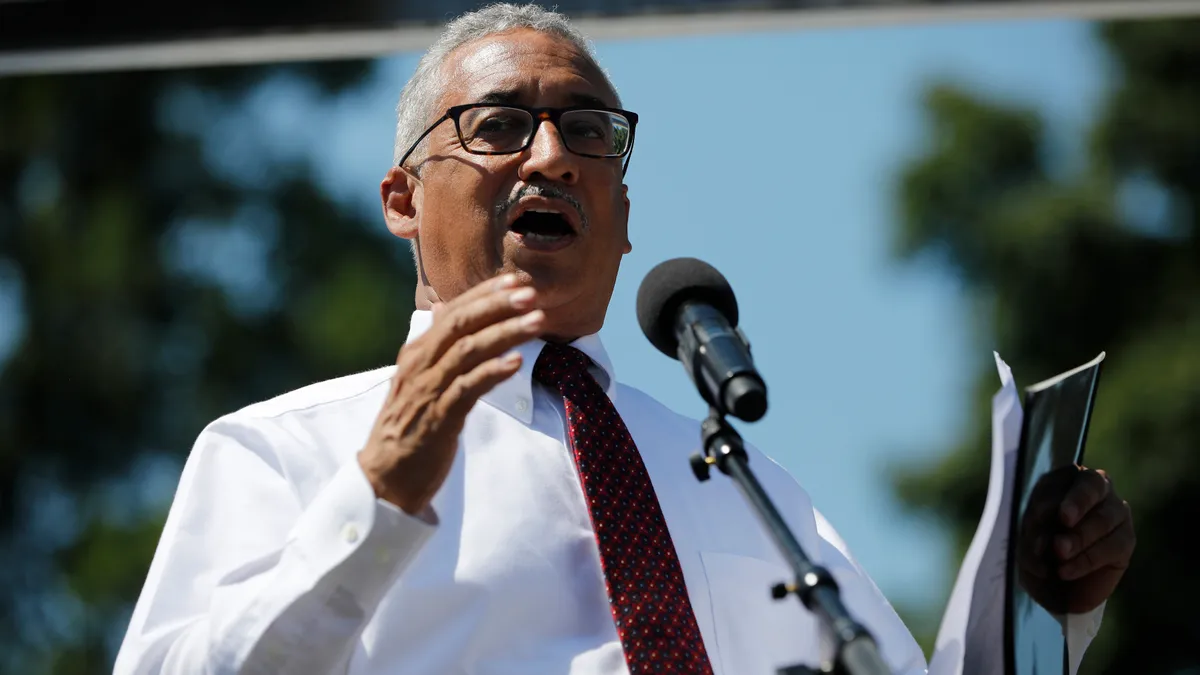Dive Brief:
- House Democrats shared a wide-ranging legislative package Tuesday that would double the Pell Grant, make two years of community college free and cap interest rates for new federal student loans.
- The package of bills has little chance of becoming law in a divided Congress, where Republicans have a majority in the House and Democrats control the Senate. But it gives insight into Democrats’ higher education priorities.
- The Democratic package is composed of bills proposed last year, including some that were introduced with bipartisan support. Democrats on the House Committee on Education and the Workforce said they plan to add more proposals to the package in the coming months.
Dive Insight:
In a video message, Rep. Bobby Scott said the Democratic proposal had three key pillars — lowering the cost of college, helping students access quality degrees and providing them with the support they need to graduate.
“A college degree is the best investment students can make for their future,” said Scott, the ranking member of the House’s education committee. “With our help, future generations may have the opportunity to enjoy the lifelong benefits that come with a college degree.”
One of the package’s largest proposals would double the Pell Grant by increasing the maximum award to $14,000 over the next five years. Student advocates have urged lawmakers to increase the Pell Grant, often pointing to data showing that its purchasing power has declined over the past few decades.
For instance, the maximum award in the 2023-24 academic year — $7,395 — covers about one-third of the average cost of attendance at a public university, according to the National College Attainment Network. That’s down from over three-quarters of the cost of attendance in the 1975-76 academic year.
Another key proposal would cover the cost of the first two years of tuition and fees at community colleges for eligible students through a federal and state partnership. The federal government would cover the entire cost of the free college program during its first year, shifting to provide 80% of the funding by the fifth and subsequent years.
The package would also open Pell Grants to graduate students. Students who received Pell Grants for their undergraduate education but still had remaining eligibility would be able to apply those awards to their first graduate degree.
The proposal would make students eligible for Pell Grants up to 16 semesters — up from 12 semesters today.
The Democratic proposal also pitches change to the federal loan system. For instance, it would eliminate capitalization of interest on student loans — meaning unpaid interest could no longer be added to a borrower's principal. And it would cap interest rates on new federal student loans at 5%.
In a post this week, Beth Akers, a senior fellow at conservative think tank American Enterprise Institute, said the proposals weren’t “particularly new or exciting.”
“While I don’t necessarily endorse the specifics of their proposed legislation, I do applaud them for getting back in the game and moving past merely championing unilateral student loan cancellation,” Akers wrote.
The Democratic proposal comes a few weeks after Rep. Virginia Foxx, a North Carolina Republican who chairs the House’s education committee, unveiled her own legislative package.
The College Cost Reduction Act would roll back recent higher education regulations and reshape the student loan system, including by placing caps on student borrowing.
Markup on the Republican proposal began Wednesday morning. Ahead of the lawmaker discussion, some higher education groups panned the package.
The American Council on Education, the higher education sector’s top lobby, told the House committee’s leaders Tuesday that it had "significant concerns with the bill as drafted,” including over the borrowing caps. However, ACE also lauded several proposals, such as paring down the number of student loan repayment options.
Other organizations — including the Center for American Progress and the Student Borrower Protection Center — took issue with language that would roll back regulations, such as the 90/10 rule. That regulation requires at least 10% of a for-profit college’s revenue to come from sources other than federal education funding.
“Students, borrowers, and taxpayers stand to waste billions of dollars on predatory, high-cost, and low-quality programs if this bill becomes law,” nearly two dozen education organizations, think tanks and student advocates said in a letter to the House’s education committee leaders.















